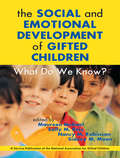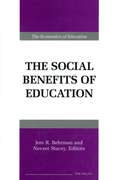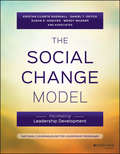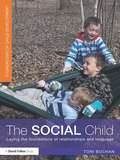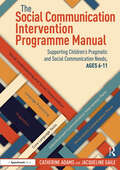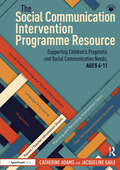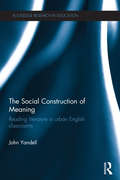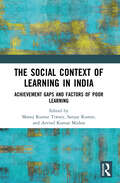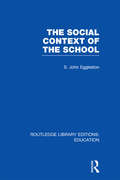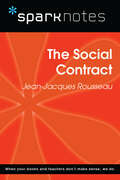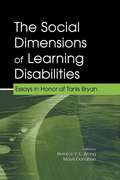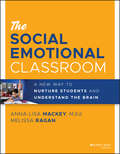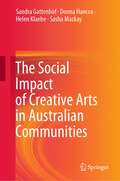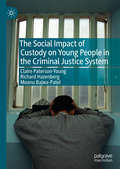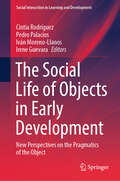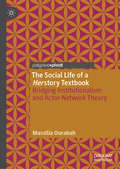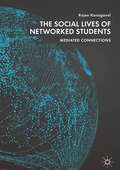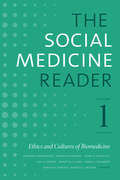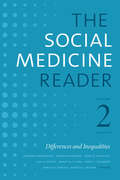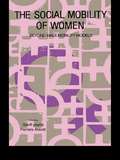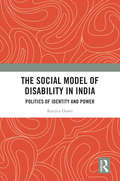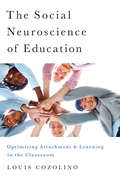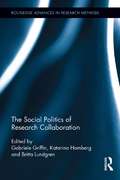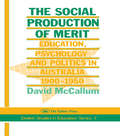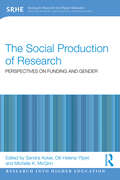- Table View
- List View
The Social And Emotional Development Of Gifted Children
by Sally M. Reis Maureen Neihart Nancy M. Robinson Sidney M. MoonThe Social and Emotional Development of Gifted Children: What Do We Know? offers an examination of the essential topics teachers, parents, and researchers need to know about the social and emotional development of gifted children. Instigated by a task force convened by the National Association for Gifted Children and written by leading scholars in the field of gifted education, the book includes chapters on peer pressure and social acceptance, resilience, delinquency, and underachievement. The book also summarizes several decades worth of research on special populations, including minority, learning-disabled, and gay and lesbian gifted students. Concise, comprehensive, meticulously researched, and wide-ranging in its coverage, The Social and Emotional Development of Gifted Children: What Do We Know? is essential reading for those who wish to enable gifted students to develop their strengths and encourage them to make the contributions of which they are capable.
The Social Benefits of Education
by Jere R. Behrman Nevzer StaceyFor decades, the primary argument in justifying education has been based on its direct economic effects. Yet education also provides "social benefits" for individuals and society at large, including a better way of taking care of ourselves, and consequently creating a better society to live in. Though it is difficult to quantify these social benefits, a more systematic analysis would improve our understanding of the full effects of education and provide a basis for considering related policies. The Office of Research of the United States Department of Education commissioned a series of papers on measuring these effects of education. Those papers, revised and updated, are collected here. Kenneth J. Arrow provides perspective on education and preference formation, and Jere R. Behrman considers general conceptual and measurement issues in assessing the social benefits of education and policies related to education. These issues are taken up by experts in four fields--health, parenting, the environment, and crime. Themes addressed include measurement issues regarding what we mean by education and its benefits; basic analytical issues in assessing the impact of education on these social benefits using behavioral data; and whether the social benefits of education justify public policy interventions. Jere R. Behrman is William R. Kenan Jr. Professor of Economics, University of Pennsylvania. Nevzer G. Stacey is Senior Research Analyst, Office of Educational Research, U. S. Department of Education.
The Social Change Model: Facilitating Leadership Development
by Wendy Wagner Susan R. Komives Daniel T. Ostick Kristan C. SkendallA comprehensive guide to using the Social Change Model in all types of curricular and co-curricular settings This book is designed to provide leadership educators with a wealth of classroom and workshop activities, discussion and reflection questions, assignment suggestions, and additional resources such as video clips and supplementary readings. It also includes several case studies for students to consider the implications of applying all eight elements of the Social Change Model in a variety of contexts. The Social Change Model of Leadership Development—upon which the book is based—was designed by well-known leadership educators and received wide acclaim and use. The validity of this model has been established through a number of research studies including the Multi-Institutional Study of Leadership. Written by leading experts and developers of the Social Change Model who often present and consult on the topic Helps curricular and co-curricular leadership educators teach the Social Change Model through individual and group activities, reflection questions, and discussion questions. Walks course or workshop facilitators through the entire process of teaching the content and facilitating and debriefing activities If you're a leadership educator of high school, undergraduate, or graduate school students, The Social Change Model: Facilitating Leadership Development is indispensable reading. Please note that The Social Change Model: Facilitating Leadership Development is intended to be used as a Facilitator's Guide to Leadership for a Better World, 2nd Edition (978-1-119-20759-7) in seminars, workshops, and college classrooms. You'll find that, while each book can be used on its own, the content in both is also designed for use together. A link to the home page of Leadership for a Better World can be found below under Related Titles.
The Social Child: Laying the foundations of relationships and language
by Toni BuchanWhat helps babies and young children develop proficient social skills? How do children's early relationships and social interactions influence their future emotional resilience and wellbeing? The Social Child thoughtfully discusses the key principles of children’s social development alongside descriptions of everyday practice. It aims to provide the reader with a rich understanding of the social skills and relationships that children develop as well as their discovery of communication and language. The book explores the importance of developing genuine, trusted and reciprocal relationships with babies and young children and shows how a child’s intrinsic drive to be social can be nourished and supported. Throughout the book, the author emphasises the importance of play in developing children‘s relationships and language skills and aims to help practitioners to: understand the factors that can help and hinder fundamental social processes for babies and young children; create secure and unconditional psychological and physical environments for children to practice their emerging language and communication skills; reflect on their own teaching methods to heighten their receptiveness to children’s social attempts to communicate through effective observation and planning; engage with parents and carers to help support children’s learning at home whilst maintaining the values of the family; celebrate the uniqueness of each child and provide learning experiences that are appropriate for individuals with particular learning needs, be they physical, emotional or cognitive to ensure that every child has an equal opportunity to succeed. Emphasising the importance of understanding the theory that underpins children’s social development, this accessible text shows practitioners how they can use this knowledge to provide learning opportunities that nourish children’s emerging communication and social skills.
The Social Communication Intervention Programme Manual: Supporting Children's Pragmatic and Social Communication Needs, Ages 6-11 (The Social Communication Intervention Programme)
by Catherine Adams Jacqueline GaileThe Social Communication Intervention Programme (SCIP) has been developed to support school-aged children (6–11 years) with social communication, pragmatic, and language needs. The Social Communication Intervention Programme Manual provides a rationale and method for providing specialist level language therapy for these children who have significant social communication differences. Evidence for the effectiveness of SCIP is included in The Manual.This book introduces the SCIP model and explores the three main components: social understanding/social inference, pragmatics, and language processing. Guidance is included on how to link assessment with therapy, how to plan and individualise interventions, and how to proceed with the programme. It contains a wealth of real-life case examples to illustrate key points, with step-by-step instructions for carrying out the interventions.Used alongside The Social Communication Intervention Programme Resource, this book offers a truly practical, tried-and-tested model to provide targeted, individualised intervention for children with social communication challenges. It is an essential tool for speech and language therapists, specialist teachers, and psychologists who are working with children with social communication, pragmatic, and language needs.For the most effective use, The SCIP Manual should be purchased alongside The SCIP Resource.
The Social Communication Intervention Programme Resource: Supporting Children's Pragmatic and Social Communication Needs, Ages 6-11 (The Social Communication Intervention Programme)
by Catherine Adams Jacqueline GaileThe Social Communication Intervention Programme (SCIP) has been developed to support school-aged children (6–11 years) with social communication, pragmatic, and language needs. SCIP provides a rationale and method for providing specialist level pragmatics and language therapy for these children who have significant social communication differences.The SCIP model is introduced in The Social Communication Intervention Programme Manual, and this book presents the content of the intervention programme itself, using a nested structure of 150 adaptable therapy activities. It contains the complete set of resources required to plan and deliver the interventions set out in the companion book, including forms, activities, and ready-made information sheets. Content can also be downloaded and printed for easy use.Used alongside The Social Communication Intervention Programme Manual, this book offers a truly practical, tried-and-tested model to provide targeted, individualised intervention for children with social communication challenges. It is an essential tool for speech and language therapists, specialist teachers, and psychologists who are working with children with social communication, pragmatic, and language needs.For the most effective use, The SCIP Resource should be purchased alongside The SCIP Manual.
The Social Construction of Meaning: Reading literature in urban English classrooms (Routledge Research In Education Ser.)
by John YandellThis book takes a fresh look at secondary urban English classrooms and at what happens when students and their teachers explore literature collaboratively. By closely examining what happens in English lessons, minute by minute, it reveals how literary texts function not as a valorised heritage to be transmitted, but as a resource for the students�
The Social Context of Learning in India: Achievement Gaps and Factors of Poor Learning
by Manoj Kumar Tiwary, Sanjay Kumar, and Arvind Kumar MishraWhy are children from disadvantaged and minority communities overrepresented among academic underachievers, poor learners, and school dropouts? This volume engages with this question and examines classroom learning as a process that involves a multitude of actors situated in specific social, cultural, and historical contexts. The volume covers an interdisciplinary spectrum of educational processes, contexts, educational ambitions, and limitations of low-caste, working-class, and middle-class students from different Indian communities and regions. The volume delves into the problem of academic underperformance from a social identity perspective and probes into social context-based variability in classroom learning, systemic disadvantages in the form of negative stereotypes, and the family as an under-studied social group in all discussions of schooling. It also examines the teachers’ perceptions and attitudes towards Adivasi students and other minority groups in primary schools and their effect on children’s classroom engagement. The chapters in this volume provide insights into unresolved and critical research questions that require the attention of teachers, school management, educators, and policymakers alike. This book will also be useful for academicians, policymakers, teacher educators, pedagogic practitioners in India and abroad, and state and central government institutions working on school education, educational psychology, policymaking in education, learning methods, and research on educational enhancement.
The Social Context of the School (Routledge Library Editions: Education)
by John EgglestonIn their appearance, schools often seem to be physically separated from their surroundings, cut off from the neighbouring houses and streets by high walls, by playgrounds or playing fields. Within the school, another world seems to exist, with a life of its own – its own routine, dress, rules and customs – which appears to have little relationship to the day-to-day life of the society outside. Yet despite these signs of separateness, we are becoming increasingly aware that a school’s surroundings, the local society in which it is set and whose children it educates, play an important part in determining what actually goes on in the classrooms and the playgrounds. This book looks at some of the factors in the local context of the schools and describes and analyses some of the often complex ways in which the schools interact with them.
The Social Contract (SparkNotes Philosophy Guide)
by SparkNotesThe Social Contract (SparkNotes Philosophy Guide) Making the reading experience fun! SparkNotes Philosophy Guides are one-stop guides to the great works of philosophy–masterpieces that stand at the foundations of Western thought. Inside each Philosophy Guide you&’ll find insightful overviews of great philosophical works of the Western world.
The Social Dimensions of Learning Disabilities: Essays in Honor of Tanis Bryan (The LEA Series on Special Education and Disability)
by Bernice Y. L. Wong Mavis L. DonahueBringing together over 25 years of research into the social aspects of learning disabilities (LD), this book presents a range of topics that reflect on the richness of research interests in the discipline. In honor of Tanis Bryan, the pioneer in research on social competence of children with LD, the researchers that follow her lead systematically examine critical issues in the social relationships of these children. The book begins by placing the work of Bryan and her research associates' in context, in terms of the prevailing theoretical frameworks and social political influences that led to the enormous impact of the work. The chapters that follow discuss: *social cognition in children and adolescents with LD; *self-understanding and self-esteem in children and adults with LD; *the lonely plight, peer influence, and friendship patterns of children with LD; *parental understanding and how this understanding shapes their scaffolding of learning in their children with language disabilities; *a new intervention approach toward enhancing self-concept and reading comprehension in LD students through bibliotherapy; *important and timely information on interventions for enhancing peer relations and preventing drop-out in adolescents; *models in longitudinal research with implications for research on social dimensions of LD; and *the important role of teachers in enhancing classroom social experiences for students with LD. Summarizing research findings and their implications in the various areas in the field, this book will be an excellent text for a special topics course in graduate programs in learning disabilities, special education, psychology, and social work. In addition, it will be a highly important resource for university/college teachers, researchers, graduate and honors students, and professionals in learning disabilities, social psychology, and social work.
The Social Emotional Classroom: A New Way to Nurture Students and Understand the Brain
by Anna-Lisa Mackey Melissa RaganLearn to implement powerful new learning techniques in your classroom experience In The Social Emotional Classroom, celebrated educators and authors Anna-Lisa Mackey and Melissa Ragan deliver an insightful, rigorous, and accessible treatment of social emotional learning in education. Using research from the Theory of Constructed Emotion, the authors highlight the relationship between the new view of neurobiology and Social Emotional Learning. The book connects five key competencies, including self-awareness, social awareness, self-management, responsible decision-making, and relationship skills, to this new understanding of the brain. You'll also learn from: Teacher stories included in each chapter The inclusion of over two decades worth of experience and research in the field of social and emotional learning Instructions and guides for educators to embed social and emotional learning into their everyday practices Perfect for K-12 educators, principals, superintendents, and other education leaders, The Social Emotional Classroom will also earn a place in the libraries of parents and caregivers who are responsible for young people's day-to-day learning.
The Social Impact of Creative Arts in Australian Communities
by Sandra Gattenhof Donna Hancox Helen Klaebe Sasha MackayThis book brings together discussions about Australian arts policy and funding, outcomes of arts engagement in terms of social inclusion, well-being and education. It presents exemplars of creative programs or case studies that build capacity and lasting impact for communities in urban and regional Australia. This book describes the impact of the arts using narrative case studies. Through this, it develops conceptual understanding and frameworks that can be used to dynamically assess the value and impact of arts engagement across the three types of cultural value: intrinsic value, instrumental value and institutional value. It focuses on how arts engagement creates, supports and extends factors such as well-being, social inclusion and educational achievement. This book provides an innovative examination of the evidence from Australian projects depicting the impact of the arts on a range of indicators and sectors.
The Social Impact of Custody on Young People in the Criminal Justice System
by Claire Paterson-Young Richard Hazenberg Meanu Bajwa-PatelThis book explores the journey of young people through a Secure Training Centre and, more generally, the criminal justice system in the UK. It examines the extent to which young people have been failed by the system at every stage of their lives, with incarceration used as a means of removing ‘the problem’ from society. To explore this process, the authors utilise an integrated theoretical framework to develop a new rehabilitative approach focused on developing positive outcomes for young people. The book deploys a social impact measurement methodology to evaluate the experience and outcomes of youth justice interventions at a Secure Training Centre. Such an approach provides a fresh perspective on the youth justice debate which has traditionally utilised outcome data to measure immediate impact relating to recidivism and is therefore not focused on the young person holistically. Using a social impact framework to evaluate youth justice, underpinned by an integrated theoretical framework, allows for assessment to be made which place the young person at the centre of evaluation.
The Social Life of Objects in Early Development: New Perspectives on the Pragmatics of the Object (Social Interaction in Learning and Development)
by Cintia Rodríguez Pedro Palacios Iván Moreno-Llanos Irene GuevaraThis book fills a gap in early developmental psychology by providing a critical reconsideration of the status of artifact objects as protagonists of children's actions and communication. The main thesis explored in the book is that objects are part of the material culture; they have public functions and social meanings that are transmitted by the members of the community. Their meanings are not "naturally" given, and children are not born knowing what to do with objects. All chapters analyze and illustrate communication with parents, or with teachers and peers in the early-years school. The book also explores the status of action and uses of materiality in communicative situations with children on the autism spectrum. The book shows objects coming alive in action and in communication, shaping the social foundations and early development of the human psyche. The book is intended for use by scholars and researchers in developmental psychology, teachers in early childhood education (mainly 0-3 years), undergraduate and postgraduate students in the fields of psychology and education, and sociocultural psychologists interested in early development.
The Social Life of a Herstory Textbook: Bridging Institutionalism and Actor-Network Theory
by Massilia OurabahThis book studies the possibility for feminist educational change by examining a case study on the social life of a French gender and women history textbook. Massilia Ourabah opens a unique and timely dialogue between two antagonistic sociological trends: institutionalism and actor-network theory (ANT), and more specifically the inhabited institution approach and the sociology of translation. The structure of the book is dual: it offers one version of the case study grounded in the institutionalist approach, and another version grounded in the translational approach. The goal is to show that through the introduction of institutional elements and the rejection of some of ANT’s strongest assumptions, the critical value of ANT can be restored and prove a useful framework for studying sociomaterial networks in education. The book also engages with feminist pedagogy and discusses the implications of the case study for the prospect of a more gender-balanced educational curriculum.
The Social Lives of Networked Students: Mediated Connections
by Rajee KanagavelThis book examines the social networks of international students, exploring the ways in which they experience social support and the role of the continuously evolving media landscape in their experiences of mobility. Drawing on survey data collected from over 250 respondents around the world, Rajee Kanagavel offers a social network analysis of transnational social formations to investigate the flow of social support through media channels, shedding light on how co-presence is no longer influenced by geographical distance. Kanagavel analyses the ways in which communication technologies are transforming the way we build and maintain relationships, and our ability to receive or give support across distance. As such, the book will be useful to scholars and students of sociology and media studies, particularly those with an interest in transnationalism, new media, social support and international student mobility.
The Social Medicine Reader, Volume I, Third Edition: Ethics and Cultures of Biomedicine
by Sue E. Estroff Jonathan Oberlander Larry R. Churchill Ronald P. Strauss Mara Buchbinder Nancy M. King Barry F. Saunders Rebecca L. WalkerThe extensively updated and revised third edition of the bestselling Social Medicine Reader provides a survey of the challenging issues facing today's health care providers, patients, and caregivers by bringing together moving narratives of illness, commentaries by physicians, debates about complex medical cases, and conceptually and empirically based writings by scholars in medicine, the social sciences, and the humanities. Volume 1, Ethics and Cultures of Biomedicine, contains essays, case studies, narratives, fiction, and poems that focus on the experiences of illness and of clinician-patient relationships. Among other topics the contributors examine the roles and training of professionals alongside the broader cultures of biomedicine; health care; experiences and decisions regarding death, dying, and struggling to live; and particular manifestations of injustice in the broader health system. The Reader is essential reading for all medical students, physicians, and health care providers.
The Social Medicine Reader, Volume II, Third Edition: Differences and Inequalities
by Sue E. Estroff Jonathan Oberlander Larry R. Churchill Ronald P. Strauss Mara Buchbinder Nancy M. King Barry F. Saunders Rebecca L. WalkerThe extensively updated and revised third edition of the bestselling Social Medicine Reader provides a survey of the challenging issues facing today's health care providers, patients, and caregivers with writings by scholars in medicine, the social sciences, and the humanities.
The Social Mobility Of Women: Beyond Male Mobility Models
by Geoff Payne Pamela AbbottFirst Published in 1990. Routledge is an imprint of Taylor & Francis, an informa company.
The Social Model of Disability in India: Politics of Identity and Power
by Ranjita DawnThis book presents various paradigms and debates on the diverse issues concerning disability in India from a sociological perspective. It studies disability in the context of its relationship with concepts such as culture/religion, media, literature, and gender to address the inherent failures in challenging prevalent stereotypical and oppressive ideologies. It traces the theological history of disability and studies the present-day universalized social notions of disablement. The volume challenges the predominant perception of disability being only a medical or biological concern and provides deeper insight into the impact of representation through an analysis of the discourse and criteria for ‘normalcy’ in films from the nineteenth and twentieth centuries. It analyzes the formation of perspectives through a study of representation of disability in print media, especially children’s literature, comics, and graphic novels. The author also discusses the policies and provisions available in India for students with disabilities, especially women who have to also contend with gender inequality and gender-based discrimination. The book will be of interest to scholars and researchers of disability studies, educational psychology, special education, sociology, gender studies, politics of education, and media ecology. It will also be useful for educationalists, NGOs, special educators, disability specialists, media and communication professionals, and counsellors.
The Social Neuroscience of Education: Optimizing Attachment and Learning in the Classroom (The Norton Series on the Social Neuroscience of Education)
by Louis CozolinoCreating a healthy, social classroom environment. This book explains how the brain, as a social organism, learns best throughout the lifespan, from our early schooling through late life. Positioning the brain as distinctly social, Louis Cozolino helps teachers make connections to neurobiological principles, with the goal of creating classrooms that nurture healthy attachment patterns and resilient psyches. Cozolino investigates what good teachers do to stimulate minds and brains to learn, especially when they succeed with difficult or "unteachable" students. He explores classroom teaching from the perspectives of social neuroscience and interpersonal neurobiology, showing how we can use the findings from these fields to maximize learning and stimulate the brain to grow. The book will have relevance to anyone concerned with twenty-first century learners and the social and emotional development of children.
The Social Politics of Research Collaboration (Routledge Advances in Research Methods #8)
by Gabriele Griffin Katarina Hamberg Britta LundgrenThe past two decades have seen an increasing emphasis on large and interdisciplinary research configurations such as research networks, and centers of excellence including those in Social Sciences and Humanities research. Little research has been undertaken, however, to understand how these new large research structures that are being called forth by research funders and research/higher education institutions alike function socially, and what the impact of operating within such structures is on those working within, and those working with, them. Past writers have discussed the "intra-agentic" operations of human researchers and the material laboratory environment in its broadest sense. This volume is concerned with the social politics of research collaboration in relation to six key positions: leaders of large research formations, leaders of sub-projects within large collaborations, participant researchers, junior and early career researchers, advisory board members, and those who look in from the outside such as researchers who are un-funded. It explores the mostly unacknowledged but critical aspect of social structures in research, discussing issues such as struggles over leadership styles, the marginalization of researchers working cross-disciplinarily, power hierarchies and intellectual ownership, and the silencing of dissent in research.
The Social Production Of Merit: Education, Psychology And Politics In Australia, 1900-1950
by David McCallumRather than concentrating on educational theory, this book examines the practical problems that educational administrators faced in their efforts to devise and maintain efficient, fair and flexible systems. The book examines the role played by educational psychologists in particular.
The Social Production of Research: Perspectives on Funding and Gender (ISSN)
by Sandra Acker Oili-Helena Ylijoki Michelle K. McGinnThe Social Production of Research offers critical perspectives on the interrelations between research funding and gender, in a climate where universities expect accountability and publishing productivity to be maintained at peak levels.Drawing upon a range of qualitative methods, contributors investigate experiences with research funding; the nature of institutional, funding body and country contexts; and the impact of social change and disruptions on research ecosystems and academic careers in Canada, Finland, Sweden and the UK. Nuanced accounts call attention to the social, emotional and political conditions within which research is produced, while identifying the ways academics enact, shape, negotiate and resist those conditions in their everyday practice.Featuring thought-provoking and critical insights for an international readership, this volume is an essential resource for researchers, academics, administrators, managers, funders, politicians and others who are concerned about the future of research funding and the importance of gender equity.
